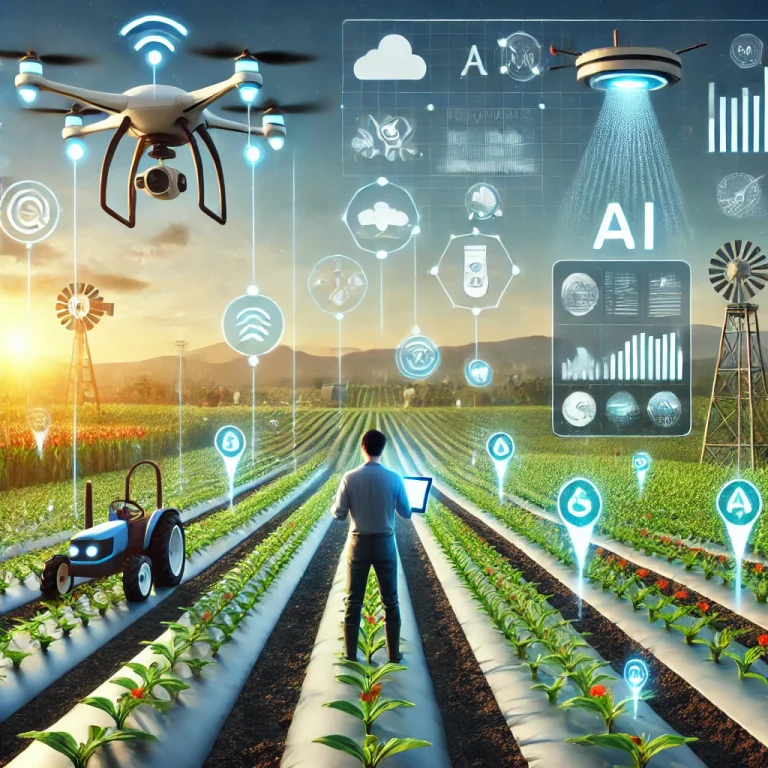AI in Agriculture: Optimizing Crop Yield and Resource Management

The agricultural industry is undergoing a transformation driven by artificial intelligence (AI). By optimizing crop yield and resource management, AI technologies are helping farmers increase productivity, reduce costs, and promote sustainable practices. This comprehensive guide explores how AI is revolutionizing agriculture.
Precision Farming
Precision farming leverages AI to collect and analyze data from various sources, such as satellites, drones, and sensors placed in fields. This data-driven approach enables farmers to monitor crop health, soil conditions, and weather patterns with unprecedented accuracy. By understanding these factors, farmers can make informed decisions on when and where to plant, irrigate, and apply fertilizers or pesticides.
For example, AI-powered drones can capture high-resolution images of fields, identifying areas affected by pests or diseases. This allows for targeted treatment, reducing the need for widespread pesticide application and minimizing environmental impact.
Crop Yield Optimization
AI algorithms can predict crop yields by analyzing historical data, weather patterns, and current field conditions. These predictions help farmers plan their harvests more effectively and optimize their use of resources. For instance, AI can determine the optimal planting time and density to maximize yield based on soil quality and climate conditions.
Moreover, machine learning models can identify the best crop varieties for specific regions, considering factors such as disease resistance, drought tolerance, and nutrient requirements. This ensures that farmers select the most suitable crops for their fields, enhancing productivity and sustainability.
Irrigation Management
Efficient water use is critical in agriculture, especially in regions facing water scarcity. AI-driven irrigation systems use sensors to monitor soil moisture levels and weather forecasts to optimize water application. These systems can automatically adjust irrigation schedules based on real-time data, ensuring that crops receive the right amount of water at the right time.
By reducing water waste and preventing over-irrigation, AI helps farmers conserve water resources and reduce costs. Additionally, optimized irrigation can improve crop health and yield, as plants receive consistent and adequate water supply.
Pest and Disease Control
Pests and diseases are significant threats to crop health and yield. AI technologies can help farmers detect and manage these threats more effectively. Machine learning algorithms analyze data from various sources, including satellite imagery, weather patterns, and historical pest outbreaks, to predict potential pest and disease risks.
Early detection allows farmers to take preventive measures, such as applying targeted treatments or introducing beneficial insects to control pests. This proactive approach reduces crop losses and minimizes the need for chemical interventions, promoting sustainable farming practices.
Resource Management
AI helps farmers manage their resources more efficiently by providing insights into the optimal use of inputs such as fertilizers, seeds, and labor. For instance, AI can recommend precise fertilizer application rates based on soil nutrient levels and crop requirements, reducing waste and environmental impact.
Furthermore, AI-driven tools can streamline farm operations by automating routine tasks and improving labor allocation. Autonomous machinery, guided by AI, can perform activities such as planting, weeding, and harvesting with high precision and efficiency. This reduces labor costs and increases operational efficiency.
Sustainable Practices
Sustainability is a growing concern in agriculture, and AI plays a crucial role in promoting eco-friendly practices. By optimizing resource use and reducing waste, AI helps farmers minimize their environmental footprint. Precision farming techniques, for example, reduce the need for excessive chemical inputs and promote soil health through targeted nutrient management.
Additionally, AI can support regenerative agriculture practices, such as crop rotation and cover cropping, by providing data-driven insights into their benefits and implementation. These practices enhance soil fertility, reduce erosion, and sequester carbon, contributing to long-term agricultural sustainability.
Case Study: AI in Vineyard Management
A vineyard implemented AI-driven solutions to optimize its operations and improve grape quality. Using drones equipped with multispectral sensors, the vineyard monitored vine health, soil moisture, and canopy density. AI algorithms analyzed this data to provide insights into irrigation needs, nutrient deficiencies, and pest infestations.
The AI system recommended precise irrigation schedules and targeted treatments, resulting in healthier vines and higher grape yields. The vineyard also reduced its water usage by 30% and minimized chemical interventions, demonstrating the effectiveness of AI in enhancing sustainability and productivity.
Future Prospects
The future of AI in agriculture is promising, with continuous advancements expected to further enhance its capabilities. Future developments may include more sophisticated AI algorithms for predicting weather patterns, advanced robotics for automated farm tasks, and integrated platforms that provide comprehensive farm management solutions.
As AI technology evolves, it will offer even more precise and efficient tools for optimizing crop yield and resource management. Farmers who embrace these innovations will be better equipped to meet the challenges of modern agriculture and ensure food security for a growing global population.
For businesses and farmers looking to leverage AI for agricultural optimization, Certainly offers a range of advanced tools designed to enhance efficiency and productivity. To learn more about their platform and services, visit Certainly’s platform page.

